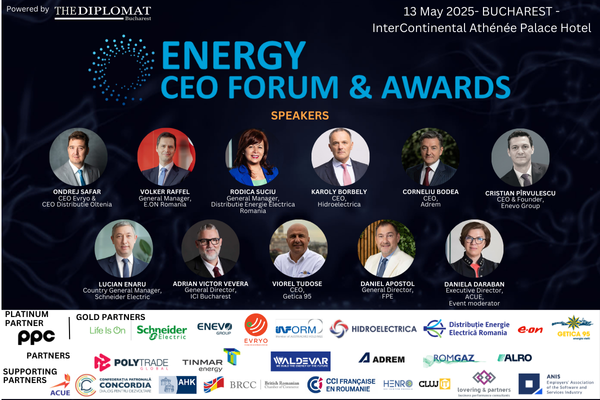Opinion article by Adrian Teampau, Director, Alina Alecu, Senior Consultant, and Maria Baran, Consultant, Circular Economy Advisory, Deloitte Romania
The integration of circular economy principles into businesses is still at an early stage globally, given that, according to the “Circularity Gap 2024” study, conducted by Deloitte and the Circle Economy Foundation, only 7.2% of the materials used in production are reused. Meanwhile, the pressure put by the linear economic model on natural resources and ecosystems has reached critical levels.
Due to its scale in economies and its proximity to the consumer, the retail industry stands out as an important pillar of the transition to the circular economy, which promises not only a decrease in resource consumption, but also a more stable access to them, as well as financial and reputational benefits. In fact, 62% of retailers surveyed by the 2024 Deloitte Global Retail Outlook believe that sustainability reresents an opportunity for the business, and expect revenues from circular business models to increase in the next five years.
The arguments guiding retailers towards circular business models refer, on the one hand, to increasingly dense regulations, especially in the EU, with compliance deadlines that come close, and, on the other hand, to ever-transforming preferences of the final consumer towards “greener” and “cleaner”. In fact, one third of the 2023 Deloitte Consumer Sustainable Survey respondents stated that they check whether the products they are about to purchase are based on recycled or biodegradable materials, while 82% of Gen-Z respondents declared that they consider the resale value of the product before buying it.
Circular business models in retail. Challenges and opportunities
The transition to circular models brings several challenges to the retail business, related to both the actual measures and to their budgeting. The first steps, decisive for the way the processes and costs will look like, are identifying the best circular business model, and respectively developing a subsequent business plan and mobilizing the teams to advance towards the objective and on the established milestones.
The “Retail Circularity Action Guide”, issued by Deloitte in collaboration with the US National Retail Federation, analyzes various scenarios and recommends resale, repair, recycling, refilling, rental and re-design as circular business models for retail. The first three models are covered extensively, with the guide highlighting examples of best practice and answering some of the most frequently asked questions in the market, such as: which models are suitable for which types of businesses, what is the potential to increase the company’s value once circularity is implemented, what strategic decisions are necessary, what resources are needed in order to launch the process, etc.
Efficiency is the watchword during this first stage, and retailers’ decisions depend on the products with which they choose to start the transformation, on consumer behavior and on the existing infrastructure that can also be used within a circular model. Investments can be significant and not necessarily profitable at this stage, which is why the transition plan must be permanently connected to the strategic priorities of the business, and the first measures should take place in a pilot project that aims to capitalize on as many of the existing resources and infrastructures as possible. It is worth mentioning that, depending on the needs and time they have at their disposal, retailers can focus on a single model, but they can also integrate multiple models, simultaneously or combined.
Resale. Resale models involve taking over used products from customers or other retailers in order to resell them on the market. The first steps are identifying the most suitable products for this business model and obtaining the necessary infrastructure for its implementation. On the other hand, a strategic decision is needed regarding the logistics partners, the technology chosen to support the process and the pricing policy. Promoting the resale model among customers is also a very important aspect, and the creation of partnerships, marketing campaigns, of tests and pilot projects on specific locations or on a limited range of products are some of the measures that could ensure the efficiency of the transition. According to the guide published by Deloitte, the categories of goods most suitable for resale include products with medium to high price, such as clothing, footwear, electronics, household appliances and furniture and interior design.
Repair. This model involves repairing used or damaged items in order to extend their lifespan, either by returning the product to its original owner or by reselling it to a second owner. While adopting this model, companies must consider the types of products that can be sustainably repaired, their collection capacities and the resources required to carry out the repair work. The retailer’s priorities in this case are identifying the qualified human resource to perform these services, tracking and demonstrating the value generated by this model, carrying out information campaigns to highlight the benefits on environment and on cost reduction for customers, as well as maintaining transparency towards customers and offering guarantees for repaired products. Also in this case, high-priced products (clothing and footwear, accessories, electronics, household appliances, furniture) are the most suitable and justify investing in infrastructure and in human resources to deal with the repair, while also ensuring a high level of consumer satisfaction. With the adoption of the new Right to Repair Directive, it is important for companies to start preparing for these regulations.
Recycling. This model is based on the collection of products that can be aggregated and sold as recyclable materials, for use in new products. Although it is the model with which many retail businesses are already familiar, in optimizing it, attention must be directed to the way of collecting products, to stimulating customers to hand over recyclable products, to financing and to partnerships. This model targets medium-low priced products, which are not suitable for resale or repair. Given that many European countries, including Romania, have already implemented or are implementing deposit-return systems, designed precisely to boost the recovery and recycling of certain categories of beverage packaging, retailers’ efforts should focus on remaining areas, for example on other types of packaging, textiles, etc.
Strategic decision-making and its communication at all levels of the organization, as well as accountability of all employees and stakeholders are essential for an efficient, just and irreversible transition to circular business models. Both management and employees must be systematically and concretely informed about the challenges that the transfromations present, as well as on the opportunities of a circular business: improved access to resources and, on a medium and long-term, better cost control, consumer loyalty and increased customer engagement, as well as better compliance and building trusty relationships along value chains.




